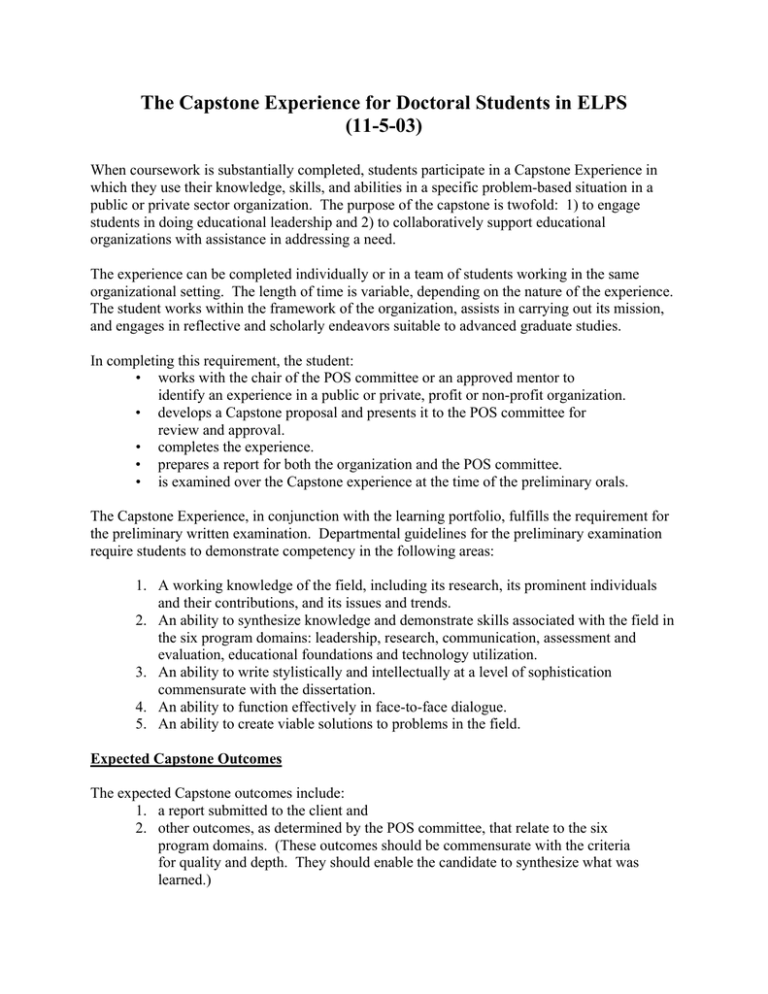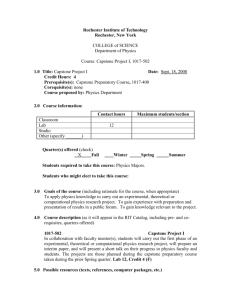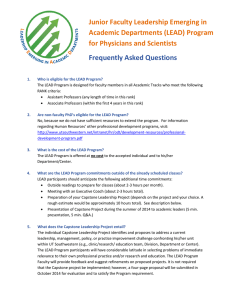The Capstone Experience for Doctoral Students in ELPS (11-5-03)
advertisement

The Capstone Experience for Doctoral Students in ELPS (11-5-03) When coursework is substantially completed, students participate in a Capstone Experience in which they use their knowledge, skills, and abilities in a specific problem-based situation in a public or private sector organization. The purpose of the capstone is twofold: 1) to engage students in doing educational leadership and 2) to collaboratively support educational organizations with assistance in addressing a need. The experience can be completed individually or in a team of students working in the same organizational setting. The length of time is variable, depending on the nature of the experience. The student works within the framework of the organization, assists in carrying out its mission, and engages in reflective and scholarly endeavors suitable to advanced graduate studies. In completing this requirement, the student: • works with the chair of the POS committee or an approved mentor to identify an experience in a public or private, profit or non-profit organization. • develops a Capstone proposal and presents it to the POS committee for review and approval. • completes the experience. • prepares a report for both the organization and the POS committee. • is examined over the Capstone experience at the time of the preliminary orals. The Capstone Experience, in conjunction with the learning portfolio, fulfills the requirement for the preliminary written examination. Departmental guidelines for the preliminary examination require students to demonstrate competency in the following areas: 1. A working knowledge of the field, including its research, its prominent individuals and their contributions, and its issues and trends. 2. An ability to synthesize knowledge and demonstrate skills associated with the field in the six program domains: leadership, research, communication, assessment and evaluation, educational foundations and technology utilization. 3. An ability to write stylistically and intellectually at a level of sophistication commensurate with the dissertation. 4. An ability to function effectively in face-to-face dialogue. 5. An ability to create viable solutions to problems in the field. Expected Capstone Outcomes The expected Capstone outcomes include: 1. a report submitted to the client and 2. other outcomes, as determined by the POS committee, that relate to the six program domains. (These outcomes should be commensurate with the criteria for quality and depth. They should enable the candidate to synthesize what was learned.) Organizational Placement for the Capstone Experience The primary responsibility for the organizational placement for the Capstone Experience rests with the student and the POS chair. The student should be identifying potential organizational sites as he/she initiates the entire Capstone Experience. If more than one ELPS doctoral student is to be working with the same organization, each student must have a line of inquiry (not necessarily the problem itself) and scholarly, analytical work that is independent from and clearly identifiable as separate and distinct from other students. Supervision of the Capstone Experience The primary Capstone Mentor may be the POS chair or suitable designee as determined by the POS chair and POS committee. A site supervisor who occupies a position in the host organization where the capstone experience occurs should also be identified. The site supervisor is encouraged to be involved in the Capstone orals either in person or via speakerphone. Capstone Proposal Each ELPS doctoral student is expected to develop a Capstone Proposal that includes: 1. Names, postal addresses, telephone and FAX numbers, and e-mail addresses (student and clients) 2. Name and responsibility of a person inside the organization with whom the student is working 3. A preliminary letter from an appropriate person in the host organization indicating that he/she is a willing participant in the experience 4. Approval signature of POS Chair 5. Overview of the project: a. Title b. Background of the problem c. Literature review (brief) d. The delineation of a clear line of inquiry supported by the preliminary literature review e. Statement of the problem including delimitations f. Objectives/methods of the study g. Timeline h. Budget i. Budgetary or logistical problems which may be part of or contribute to/detract from the proposed work (extenuating circumstances) j. Means of reporting results (i.e., report, presentation, product) k. Summary of deliverables to be completed by the end of the experience and presented to l. m. n. o. the POS committee for discussion at the preliminary orals Ethical considerations Definition of terms Human Subjects Approval (if appropriate) Bibliography The POS chair and committee must approve of the capstone proposal and sign-off that it meets their expectations. No student may initiate his/her capstone experience without an accepted capstone proposal approved by his or her POS chair and committee. Ethical Considerations One of the important dimensions of this experience is that students are aware of, sensitive to, and ultimately honor ethical obligations to the client’s organization. Toward that end, students should resolve ethical issues related to protecting confidentiality, determining data ownership, presenting data in forums other than the preliminary oral examination, and other ethical issues idiosyncratic to the client’s organization. These topics should be discussed with both the capstone mentor and the client. The discussions should be documented in the final report. The Capstone Report(s) The final report should include the following: 1. Title page 2. Table of contents 3. Executive summary (abstract) 4. Introduction to problem (background and brief literature review) 5. Methodology 6. Data sources and methods 7. The solution (maybe an invention, document, product) 8. Ethical considerations 9. Definition of terms 10. Bibliography 11. Appendix (include Human Subjects Approval form) Note: The student is expected to maintain a portfolio which documents all procedures, meetings, draft reports, and unexpected difficulties to overcome. Preliminary Orals The meeting to satisfy the requirement of the preliminary oral examination will be scheduled when the project is completed. In addition to the POS committee, a representative from the capstone placement site is encouraged to attend either in person or via speakerphone. A student will bring his/her learning portfolio to the meeting. The student will present his/her capstone project and describe how the experience related to the six program component areas. The portfolio will be circulated to the committee and used as a basis for additional discussion.



